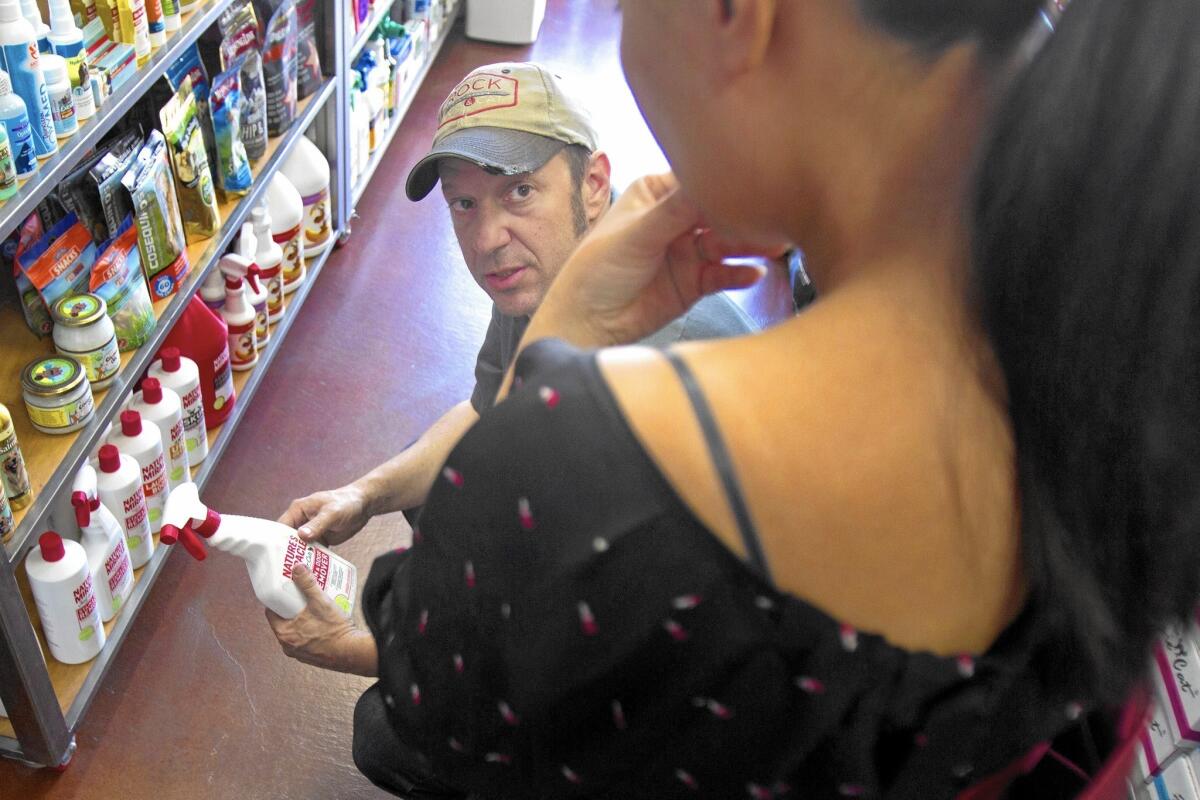Small pet stores thrive by offering unusual products, personal service

Chicken patties, grain-free kibble and animal carriers fill an eight-shelf floor-to-ceiling display behind the register at Rock Dog & Cat.
Regulars dash into the small Eagle Rock pet store to pick up organic dog treats or feathery cat toys. They chat with owner Peter Berman and pet Vinny, the store’s greeter dog.
“I’m always looking for something that carries higher food quality and especially raw food,” said Jennifer Erholm, who has three cats and one dog. “I don’t have kids, so let’s say they’re very important.”
------------
FOR THE RECORD:
Pet stores: In the May 12 Business section, an article about the growth of independent pet retailers said that PetSmart Inc. revenue is projected to reach about $6.6 million for 2014-2015 from about $5.4 million in 2010-2011, and that Petco Animal Supplies Inc. sales will increase about $3.2 million this year from $2.7 million in 2010, according to estimates from market research firm IBISWorld. Those figures should have been in billions of dollars.
------------
Independent stores such as Rock Dog & Cat are thriving as pet ownership rises, and dog and cats increasingly are seen as family members.
Such retailers have survived the expansion of big-box brands PetSmart and Petco as well as other places to buy pet products, such as supermarkets and online vendors. And they have weathered consumers’ post-recession reluctance to spend.
The pet store industry is projected to generate $17.5 billion in revenue this year, a nearly 20% increase over 2010’s $14.6 billion in sales, according to market research firm IBISWorld.
Although more than half of that revenue comes from PetSmart and Petco, the industry is also defined by a large number of small retailers.
In 2014, there were 8,296 regional and independent pet store chains, each with fewer than 200 locations, up slightly from the year before, according to the GfK market research firm. In comparison, Petco and PetSmart combined operate about 2,800 stores.
“These smaller chains are really successful because they get to know their customers,” said Steve King, president of the Pet Industry Distributors Assn., which works with pet product wholesalers. “They can be much more nimble in the marketplace and bring on products that are new and trending and hot.”
Pet store owners point to unusual products as crucial to their success.
Near the cash register at Rock Dog and Cat, Berman stocks hand-knit dog scarves made by a local artist.
At pet boutique Pussy & Pooch’s Beverly Hills location, specialty raw food is a top-selling item, said co-owner Janene Zakrajsek. The four-store chain focuses on premium offerings, including the Pawbar, an in-store cafe that serves raw meat meals, organic prepared food and treats.
“What humans now have for themselves, they want that for their animal,” Zakrajsek said.
The heaviest purchasers of pet products tend to be customers that are health-conscious and are from households that earn more than $70,000, said James Russo, senior vice president of global consumer insights at Nielsen.
“The overall consumer landscape has a major focus on health and wellness,” Russo said. “That trend filters into our pets. Pets are an incredibly important part of families.”
People with pets often fall into one of three categories: the pet owner, who still “thinks of the animals more so as property,” the pet lover and the pet parent, Zakrajsek said.
Pet parents drive growth in the services category, she said.
Pet services, such as full service grooming, tooth brushing and day camps, are the fastest-growing product segment for the industry over the last five years, according to IBISWorld.
Such attitudes also play a role in the expansion of PetSmart and Petco.
Phoenix-based PetSmart Inc. has grown to 1,404 locations from 1,149 stores in 2009. Revenue is projected to reach about $6.6 million for 2014-2015 from about $5.4 million in 2010-2011, according to estimates from IBISWorld.
San Diego-based Petco Animal Supplies Inc. has also seen sales increase to an estimated $3.2 million this year from $2.7 million in 2010, according to IBISWorld. The company operates 1,411 stores compared to 950 locations in 2009, IBISWorld said.
The expansion is more than just big-box stores. In 2009, the company introduced stores named Unleashed by Petco that are intended to “answer the call of our customers who were looking for a smaller footprint, locally focused neighborhood pet store,” Petco spokeswoman Megan Oxford said. The smaller stores spotlight “high-quality products” and the “very best” in dog and cat food, Oxford said. The stores also host events such as pet birthday parties and meet-ups.
In the next five years, IBISWorld forecasts, PetSmart and Petco will grow even larger, posing a threat to smaller retailers who are unable to differentiate themselves and find a niche.
Customer service is a point of pride for many small pet stores.
Berman said that employees of Rock Dog and Cat frequently know what their customers will buy, even before they open their mouths.
“Just shopping here twice, people would know you,” Berman said. “That’s the benefit of going to a little neighborhood store.”
More to Read
Inside the business of entertainment
The Wide Shot brings you news, analysis and insights on everything from streaming wars to production — and what it all means for the future.
You may occasionally receive promotional content from the Los Angeles Times.











